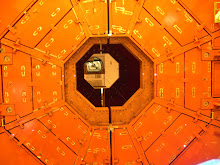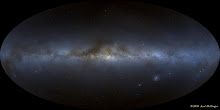 On the left, the ultimate portable atomic clock, the size of a grain of rice from NIST and DARPA, 2004. Works using a tiny laser. Accurate for 300 years. A bit of overkill. Do we really need these in cell phones to come? Whether we want these gizmos or not is irrelevant. Some corporation will decide to manufacture them and soon they'll be everywhere. It's the logic of the age we live in. It's also the logic of Science. Actually a simple definition of Science, apart from the Latin root To Know, from the earlier verb To Cut, is the application of logic to all phenomena. That's how Science started in the mists of time when people perceived an orderly pattern to things that had a logic to it. That's also Science's Central Dogma, that the Universe is logical. On this one assumption everything rests. If Science ever hits a brick wall, it will be the discovery of something beyond logic. But Scientists are confident that will never happen, although there are many baffling gaps in their knowledge, the manufacturing of logical theories to cover them is almost as good as having the knowledge they lack, a working hypothesis.
On the left, the ultimate portable atomic clock, the size of a grain of rice from NIST and DARPA, 2004. Works using a tiny laser. Accurate for 300 years. A bit of overkill. Do we really need these in cell phones to come? Whether we want these gizmos or not is irrelevant. Some corporation will decide to manufacture them and soon they'll be everywhere. It's the logic of the age we live in. It's also the logic of Science. Actually a simple definition of Science, apart from the Latin root To Know, from the earlier verb To Cut, is the application of logic to all phenomena. That's how Science started in the mists of time when people perceived an orderly pattern to things that had a logic to it. That's also Science's Central Dogma, that the Universe is logical. On this one assumption everything rests. If Science ever hits a brick wall, it will be the discovery of something beyond logic. But Scientists are confident that will never happen, although there are many baffling gaps in their knowledge, the manufacturing of logical theories to cover them is almost as good as having the knowledge they lack, a working hypothesis.It's these theories that scientists keep on testing, whether it's smashing atoms or toying with genetics. This is Big Science, the biggest game of all time. Of course, Science's parameters are those of the known physical Universe. What they expect to find and measure has to be physical, since after all they use physical instruments. But what if there are Non-physical Universes informing this one or even shaping it? Then they'll never be able to find out for certain if the Universe is logical or not.
Somewhere in the early 20th century Science split off entirely from Art. Now it's all theory and experiment, without a thought for consequences. It's aim like Art's was a certain amount of pleasure and usefulness, like the compass rose above. Now it's an endless stream of data that even overwhelms its specialist fields, and specialists can't keep up, where now a chemist and a physicist haven't got much in common and can't understand each other's work. It's becoming all rather dehumanizing. But we go on.
The latest big thing in Physics, another theory is theoretically we have Dark Matter and Dark Energy, surmised but not yet detected. Well, there are deficiencies in the Big Bang theory. To satisfy them, the known Universe of matter and energy now accounts for only 4% of the total Universe, the rest or 96%, is this unknown dark matter and dark energy we haven't detected. And Antimatter might exist as stars and galaxies where there is no ordinary matter, which would annilate it. Antiparticles have been found, but no Antimatter, though CERN and later Fermilab with CERN's assistance actually created a few atoms of antihydrogen. It's superhot and with no way to contain it, it's readily annihilated in 10 seconds, releasing 100% of its energy and ordinary hydrogen's in contact with it. 100% energy efficient whereas a hydrogen bomb is only 7%. More dreams of an endless supply of energy, except it's way too expensive, at least $25 million a gram.
Anyway, we're in an age of endless speculation and experimentation. The effect on civilization is destabilizing. Some of this Science trickles down to us and now we're living with machines instead of friends and family. With cars instead of horses, with bulbs instead of candles. Are we better off?
Yet we're still trying to get to the bottom of this Universe. It's one thing to daydream. We all do it even those who are PhD deficient. Another to test any and all theories endlessly. But the real worry is Science's destructive experiments and applications of destructive research which eventually affect us all. From one bomb at Los Alamos to a giant nuclear arsenal and a thousand nuclear reactors and no way to safely dispose of them. While we've got our hands full of problems dumped on us by Science that Science is not addressing, a new era of Big Science is dawning. Genetic manipulation and Nuclear Fusion and Super Colliders like CERN's LHC, due to start up in 2008. What's really going to happen when lead nuclei are smashed together in the LHC at super colossal energies never before attempted? Collisions at nearly twice the speed of light? This isn't atom smashing anymore, this is a new type of Fusion Reaction. Even some physicists are demurring. It could be the end of the world.
 Cointrin
Cointrin

























No comments:
Post a Comment